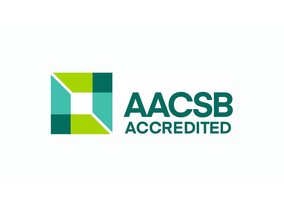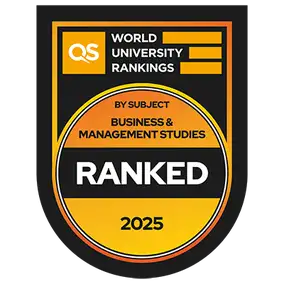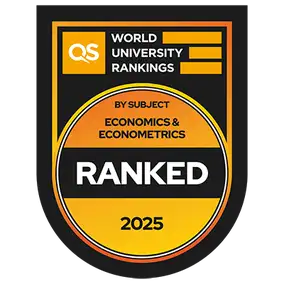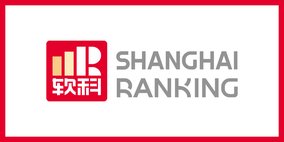- Where you can study
-
Auckland campusDistance and onlineManawatū campus (Palmerston North)
-
International students
International students are not New Zealand citizens or residents.
- Open to international students on campus in New Zealand
Specialise in Economics for your Bachelor of Business at Massey
A versatile major, the Bachelor of Business (Economics) trains you in understanding how the economy operates at both micro and macro levels.
You will study the business environment, the role of competition and the connections between different sectors in the economy. You will learn about the effects the world economy has on New Zealand business and people. This includes what the government can do to foster healthy businesses and advance innovation, but also about the effects of excessive government interventions.
In this major, you can specialise in a number of areas including: international trade and finance, resource and environmental economics, financial economics, managerial economics and public policy.
Our lecturers and professors are actively researching both nationally and internationally, bringing the most relevant developments in business theory and practice to the classroom.
The Bachelor of Business will give you the leadership, communication and critical thinking skills that will make you a sought-after employee. It will give you skills you can use in many different types of businesses, in New Zealand and around the world.
You will gain a good grounding in economic fundamentals as well as a broad understanding of the core elements of business.
Further study
You may wish to consider the Master of Business Studies and then a PhD upon completion of this qualification.
A Bachelor of Business in Economics is a good fit if you:
- have an interest in the world of finance
- enjoy working with numbers
- think analytically and logically.
Planning information
Planning information
The BBus provides considerable flexibility, enabling you to take control of your own qualification within the regulations.
If you study full-time, in your first year, you’ll take eight 15-credit courses, making a total of 120 credits.
If you wish to study over two semesters, you should aim for 60 credits per semester. You may be able to take some courses at summer school. Make sure you include courses that are prerequisites for the next level of courses you wish to study.
Core business courses
There are 10 core business courses and you must pass at least 8 of them. The core courses are 115111, 115112, 115113, 115114, 115115, 115116, 115211, 115212, 115230 and 115340.
You must pass at least 60 credits of 100-level core courses within the first 120 credits, and and at least 30 credits of 200 or 300-level core courses within the first 240 credits of study towards the degree.
These are courses which cover topics across the business spectrum. They are designed to give you the leadership, communication and solid business skills that you will need in your career.
Minors
Completing a minor is optional. Minors increase the breadth of your degree. They give you extra knowledge, attributes and capabilities.
A minor must be in a different subject from your major.
A Bachelor of Business (Economics) with a minor
You may choose a minor from any University undergraduate degree that has recognised minors. If the minor is from another undergraduate degree, the regulations of that qualification will apply.
An Economics minor (for students who are studying a different degree)
If you are not studying a Bachelor of Business (Economics) and wish to complete a minor in Economics see the BBus regulations for the requirements of this minor.
Official regulations
To understand what you need to study and must complete to graduate read the official rules and regulations for this qualification.
You should read these together with all other relevant Statutes and Regulations of the University including the General Regulations for Undergraduate Degrees, Undergraduate Diplomas, Undergraduate Certificates, Graduate Diplomas and Graduate Certificates.
Returning students
For returning students, there may be changes to the majors and minors available and the courses you need to take. Go to the section called ‘Transitional Provisions’ in the Regulations to find out more.
In some cases the qualification or specialisation you enrolled in may no longer be taking new enrolments, so may not appear on these web pages. To find information on the regulations for these qualifications go to the Massey University Calendar.
Please contact us through the Get advice button on this page if you have any questions.
Courses you can enrol in
Courses you can enrol in
Course planning key
- Prerequisites
- Courses that need to be completed before moving onto a course at the next level. For example, a lot of 200-level courses have 100-level prerequisite courses.
- Corequisites
- Courses that must be completed at the same time as another course are known as corequisite courses.
- Restrictions
- Some courses are restricted against each other because their content is similar. This means you can only choose one of the offered courses to study and credit to your qualification.
Core courses for the Bachelor of Business
As well as the specialisation courses listed below, this qualification has core courses that you will need to complete.
Bachelor of Business core courses
Economics courses
Compulsory courses
Course code: 178200 Macroeconomics 15 credits
The development and application of macroeconomic models to globally-oriented economies, and the assessment of real-world policy problems from a practical perspective.
View full course detailsCourse code: 178201 Microeconomics 15 credits
The development and application of models of consumer optimisation, producer behaviour, and competition in markets.
View full course detailsCourse code: 178300 Macroeconomic Policy and Applications 15 credits
This course incorporates financial markets into macroeconomic models and analyses government policies that address current macroeconomic events.
View full course detailsCourse code: 178301 Competition and Industry 15 credits
The modelling of microeconomic decision-making of competing firms in industries, with application to real-world issues.
View full course detailsCourse code: 178312 Globalisation and Trade 15 credits
An examination of selected economic concepts to the operation of global trade, agribusiness and financial markets.
View full course detailsCourse code: 178360 Sustainability, Environmental and Climate Change Economics 15 credits
A survey of environmental and climate change issues and the application of economic analysis to these issues and policies to achieve sustainable outcomes.
View full course detailsCompulsory course selection
15 credits from
Course code: 178230 The Economics of Human Behaviour 15 credits
An in-depth exploration of people's real-world decision-making processes with insights from psychology and other behavioural sciences.
View full course detailsCourse code: 178280 Regression and Predictive Analysis 15 credits
An introduction to regression and predictive analysis, using real world data to provide actionable insights that aid organisational decision-making processes.
View full course details15 credits from
Course code: 178370 Development Economics 15 credits
An examination of major development problems and issues, both domestic and international, from a combined economic theory, empirical and policy-oriented perspective.
View full course detailsCourse code: 178380 Business Forecasting 15 credits
Specification and estimation of business models for policy analysis and forecasting. Treatment of common problems encountered in real world data analysis using econometric models.
View full course detailsEntry requirements
Entry requirements
Admission to Massey
All students must meet university entrance requirements to be admitted to the University.
Specific requirements
There are no specific entry requirements for this qualification, outside of university admission regulations.
English language requirements
To study this qualification you must meet Massey University's English language standards.
English language skills
If you need help with your English language skills before you start university, see our English for Academic Purposes (EAP) courses.
Fees and scholarships
Fees and scholarships
2026 tuition fees
- Domestic students: $7,415
- International students: $38,080
Tuition fees are estimates only. The exact fees charged will depend on which courses you select at the time of enrolment. The estimates are for full-time study (120 credits). Fees are in New Zealand dollars and include Goods and Services Tax (GST).
The estimates do not include the Student Services Fee. This fee is $1,164 for on-campus students and $948 for distance students for full-time study (120 credits). For more information about this fee and other fees you may need to pay, see non-tuition fees.
There may also be charges for things such as study resources, software, trips and contact workshops.
Course fees
You can view fees for the courses that make up your qualification on the course details pages.
Student loans (StudyLink) and Fees Free scheme
You may be eligible for a student loan to help towards paying your fees.
The New Zealand Government offers fees-free tertiary study for eligible domestic students. Find out more about the scheme, including how much could be covered and your eligibility on the Inland Revenue website.
Scholarship and award opportunities
- Massey University Undergraduate First Year Scholarship – School Leavers
- McEwan Pacific Student Scholarship
Fees disclaimer
This information is for estimation purposes only. Actual fees payable will be finalised on confirmation of enrolment. Unless otherwise stated, all fees shown are quoted in New Zealand dollars and include Goods and Services Tax, if any. Before relying on any information on these pages you should also read the University's Disclaimer Notice.
Careers and job opportunities
Careers and job opportunities
There are career opportunities in both public and private sectors, large and small firms, international agencies, the education sector, economic policy makers and social organisations. The following are examples of some of the career options:
- agricultural economist
- business analyst
- economic consultant
- energy research officer
- environmental economist
- financial policy advisor
- health economist
- international economist
- institution development coordinator
- energy researcher
- competition analyst
- trainee dealer.
Government agencies such as Treasury, The Reserve Bank, the Ministry of Business and Innovation, and international agencies such as World Bank or International Monetary Fund all recruit economics graduates.
An economics degree can also be a gateway to employment in many other areas, like management, planning, politics, education, finance and banking, or in journalism and the media. You can design your economics major to suit your interests and career objectives.
International students
International students
New Zealand is a great place to study. Massey University’s reputation is supported by our international rankings, accreditations and associations. We are rated five star plus by the QS World University Rankings.
Massey University has small class sizes, and our lecturers and staff are friendly and approachable.
As an international student, there are entry requirements that will apply to you. We recommend that you apply at least three months before your anticipated start date so your application can be processed in time. There are additional steps you will need to take. These include obtaining a visa and travel bookings if your study is to be in New Zealand.
What our students say
“While challenging, I found the economics major at Massey to be extremely versatile, interesting and valuable. I developed strong quantitative, qualitative and critical thinking skills throughout. Skills that have enabled me to apply for, and deliver tangible change within, a wide range of jobs.”

Accreditations and rankings

Association to Advance Collegiate Schools of Business (AACSB)
Massey Business School is rated in the top 5% of global business colleges by AACSB International.

QS Ranking - Business Management Studies
Massey University is ranked by QS (Quacquarelli Symonds) as one of the top 500 universities for business and management.

QS Ranking - Economics and Econometrics
Massey University is ranked by QS (Quacquarelli Symonds) as one of the top 350 universities for economics and econometrics.
Related study options
Diploma in Facilities Management – DipFM
Learn about operational maintenance and management of built facilities with Massey's Diploma in Facilities Management. This will open the way to a diverse and challenging career.
Economics – Bachelor of Arts (Honours)
With Massey’s Bachelor of Arts (Honours) (Economics) you can take your undergraduate study of economics further.
Economics – Master of Business Studies
Massey’s Master of Business Studies (Economics) will give you the business and economics skills to take your career to the next level. Specialising in economics will give you many career options.
Economics – Bachelor of Arts
Succeed as a professional in the private, not-for-profit or public sector. Learn how the economy affects our everyday life, culture, and environment.
Economics – Diploma in Arts
Improve your economic decision-making skills and understanding with Massey’s Diploma in Arts (Economics).
Economics – Postgraduate Diploma in Arts
With Massey's Postgraduate Diploma in Arts (Economics) you’ll build on your undergraduate interests and further investigate topics in economics that have taken your interest.
Economics – Master of Arts
Open up a world of employment options. With Massey’s Master of Arts (Economics) you’ll build on your undergraduate interests and develop your analysis and research skills.
Economics – Graduate Diploma in Arts
The Graduate Diploma in Arts (Economics) will give you the equivalent of an undergraduate major in economics without having to complete a second bachelor’s degree.
Graduate Diploma in Construction and Facilities Management – GradDipConstFM
Build on your existing knowledge and skills in construction with Massey’s Graduate Diploma in Construction and Facilities Management. Learn how to organise, control and coordinate the strategic and operational management of facilities.

